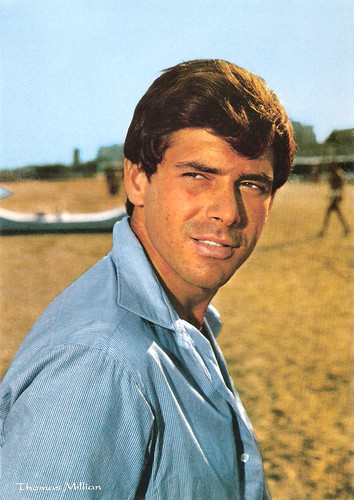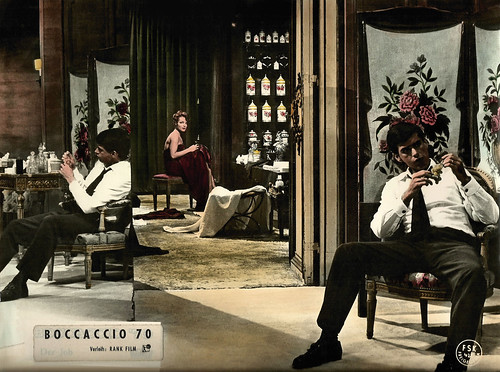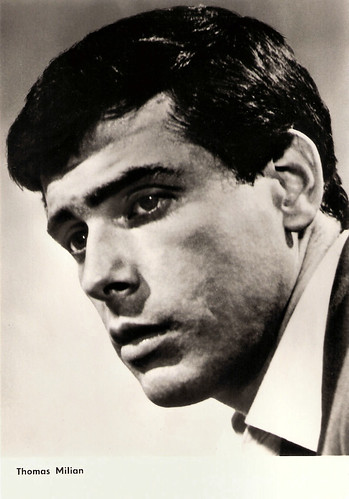On Wednesday 22 March 2017, Cuban-American actor Tomas Milian passed away. He worked extensively in Italian films from the early 1960s to the late 1980s. Milian played neurotic and sadistic killers in several Spaghetti Westerns of the 1960s and lone-wolf anti-heroes in violent action and police thrillers of the 1970s. Very popular in Italy were his crime-comedies of the late 1970s and 1980s. Besides these genre films, he worked with such prolific directors as Mauro Bolognini, Luchino Visconti, Bernardo Bertolucci and Michelangelo Antonioni. Tomas Milian was 84.

Italian postcard by Rotalfoto, Milano, in the series Artisti di sempre, no. 118.
Tomas Milian was born as Tomás Quintín Rodríguez in Havana, Cuba in 1933 (some sources say 1932). His name is also written as Tomás Milián and Thomas Milian.
He is the son of Tomas Rodriguez, a general serving the dictatorship of Gerardo. His father was arrested and jailed after dictator Fulgencio Batista took power in Cuba in 1933. Rodriguez committed suicide in 1945 in his home, with Tomás as an eyewitness.
In 1955, Milian decided to leave Cuba. Arriving in Miami he worked in several small jobs. He joined the navy for a few months to get his American citizenship.
In New York he auditioned at the Actors Studio, where he was taught the seminal ‘Stanislavsky method’ of acting. He played on Broadway in Maidens and Mistresses at home at the Zoo. Author Meade Roberts had written the piece just for him. Milián also appeared on the short-lived television series Decoy in 1957.
In 1958 he went to Italy for a part in the play The Poet and the Muse by Jean Cocteau, which was performed at a theatre festival in Spoleto. There he decided to relocate, and he stayed in Italy for 30 years.
His Italian film debut was as a young Roman criminal in the social drama La notte brava/Bad Girls Don't Cry (Mauro Bolognini, 1959) with Rosanna Schiaffino and Elsa Martinelli. With Bolognini, he also worked on Il bell'Antonio/Handsome Antonio (Mauro Bolognini, 1960) with Marcello Mastroianni and Claudia Cardinale. The film won the Golden Leopard at the Locarno International Film Festival.
Milian appeared in other classic art house films such as I Delfini/The Dauphins (Francesco Maselli, 1960) starring Claudia Cardinale, and Luchino Visconti’s part of the anthology film Boccaccio '70 (1962), opposite Romy Schneider. In most of his Italian films, his voice was dubbed due to his accent. Milian performed his lines in Italian. Gradually he became a very successful performer in the European cinema.

Publicity still distributed by Rank in Germany (see the mark of the German censor FSK at the right). Thomas Milian and Romy Schneider in Luchino Visconti's episode Il Lavoro in the episode film Boccaccio 70 (1962). Milian plays a bored aristocrat, caught in a scandal with callgirls. Schneider plays his rich and equally bored Austrian wife, who tries to seduce her husband and make him pay for love just like he did with his callgirls. It works, but leaves the woman with bitterness. The set of the film was very costly because of all the authentic, valuable objects present.
After five years of making what he deemed ‘intellectual’ films, Tomas Milian was unhappy with his contract with producer Franco Cristaldi and thought of going back to the United States.
Needing money to start over, he took the opportunity to star as a bandit in the Spaghetti Western El precio de un hombre/The Bounty Killer (Eugenio Martin, 1966). This Spanish-Italian production gave his career an unexpected boost, and ultimately resulted in his staying in Italy.
His next Western was La resa dei conti/The Big Gundown (Sergio Sollima, 1966) with Lee Van Cleef. According to Wikipedia it falls in to the subgenre called Zapata Westerns: Spaghetti Westerns with some political context usually concerning the Mexican revolution.
Milian played Cuchillo, a charming rogue accused of rape and murder. He played the role again in Corri, uomo, corri/Run, Man, Run! (Sergio Sollima, 1968) with Gian Maria Volonté. Milián became a star of the Spaghetti Western genre.
Among his films are the brutally violent Se sei vivo spara/Django Kill (Giulio Questi, 1967), Sentenza di morte/Death Sentence (Mario Lanfranchi, 1968) starring Richard Conte, and Vamos a matar, compañeros/Compañeros (Sergio Corbucci, 1970) with Franco Nero.
Milian often played Mexican bandits or revolutionaries, roles in which he spoke in his real voice. When the Spaghetti Western dwindled, Milián remained a star. He starred in the drama I cannibali/The Cannibals (Liliana Cavani, 1970), inspired by the Antigone of Sophocles.
He had a supporting part in Dennis Hopper’s The Last Movie (1971), which won the Critics Prize at the Venice Film Festival, but failed financially and critically. More successful was the Giallo Non si sevizia un paperino/Don't Torture a Duckling (Lucio Fulci, 1972) in which he starred with Barbara Bouchet.
Milian also excelled in another genre, the Poliziotteschi (Italian police crime films). His first film in this genre Milano odia: la polizia non può sparare/Almost Human (1974) lead to five more films with the director, Umberto Lenzi.

East-German card by VEB Progress Film-Vertrieb, Berlin, no. 2371, 1965. Retail price: 0,20 MDN.
In the late 1970s, Tomas Milian turned to comedy. In Il trucido e lo sbirro/Free Hand for a Tough Cop (Umberto Lenzi, 1976), Milian played for the first time the petty thief Sergio Marazzi aka ‘Er Monnezza’, a role that he later played two more times.
Another recurring character was the Serpico-like police officer Nico Giraldi, which he played in 12 crime-comedies. Although his voice was dubbed most of the time by Ferruccio Amendola, Milian wrote his own lines in Roman slang. Milián's inventive use of romanesco (roman dialect) made him somewhat of a cult performer in Italy, even though his later films were critically panned.
Wikipedia cites Bruno Corbucci, the director of many of these films: "At the cinemas as soon as Tomás Milian appeared on the screen, when he made a wisecrack and in the heaviest situations, then it was a pandemonium, it was like being at the stadium."
As Milian used similar make-ups and accents in portraying both characters, Monnezza and Nico were occasionally confused by Italian audiences. In Italy, Milián is now still associated with these performances.
Occasionally he appeared in non-genre pictures, such as Bernardo Bertolucci's La Luna/Luna (1979), for which he won a Nastro d'Argento for Best supporting Actor, and Michelangelo Antonioni's Identificazione di una donna/Identification of a Woman (1982). In the latter, Milián plays a divorced middle-aged filmmaker searching for a woman to play the leading role in his next film, and also in his life. The film was awarded the 35th Anniversary Prize at the 1982 Cannes Film Festival.
During his 30 years in Italy, Milian received two major awards for his contribution, the Antonio de Curtis Award for Comedy and the Coppa Del Consiglio Dei Ministri from the Italian government. In 1989, he decided to go back to the United States.
He played character parts in Revenge (Tony Scott, 1990), Amistad (Steven Spielberg, 1997) and Traffic (Steven Soderbergh, 2000). He also performed on stage. More recently he appeared in Andy Garcia’s Cuban drama The Lost City (2005), and in the political thriller The Feast of the Goat (Luis Llosa, 2006), based on Mario Vargas Llosa's novel about the assassination of Dominican dictator Rafael Leonidas Trujillo.
Tomas Milian died in Miami, Florida, where he had lived in retirement. Since 1964, he was married to Rita Valletti. They had one son, Tommasso. Milian was 84.
Trailer Faccia a faccia/Face to Face (Sergio Solima, 1967). Source: Cultcinedotcom (YouTube).
Trailer Roma a mano armata/The Tough Ones (Umberto Lenzi, 1976). Source: Thomas Crommentuyn (YouTube).
Trailer Identificazione di una donna/Identification of a Woman (1982). Source: Tomas Milian (YouTube).
Sources: Sandra Brennan (AllMovie), Tom B. (Westerns... All’ Italiana), The Spaghetti Western Database, Wikipedia and IMDb.

Italian postcard by Rotalfoto, Milano, in the series Artisti di sempre, no. 118.
Eyewitness
Tomas Milian was born as Tomás Quintín Rodríguez in Havana, Cuba in 1933 (some sources say 1932). His name is also written as Tomás Milián and Thomas Milian.
He is the son of Tomas Rodriguez, a general serving the dictatorship of Gerardo. His father was arrested and jailed after dictator Fulgencio Batista took power in Cuba in 1933. Rodriguez committed suicide in 1945 in his home, with Tomás as an eyewitness.
In 1955, Milian decided to leave Cuba. Arriving in Miami he worked in several small jobs. He joined the navy for a few months to get his American citizenship.
In New York he auditioned at the Actors Studio, where he was taught the seminal ‘Stanislavsky method’ of acting. He played on Broadway in Maidens and Mistresses at home at the Zoo. Author Meade Roberts had written the piece just for him. Milián also appeared on the short-lived television series Decoy in 1957.
In 1958 he went to Italy for a part in the play The Poet and the Muse by Jean Cocteau, which was performed at a theatre festival in Spoleto. There he decided to relocate, and he stayed in Italy for 30 years.
His Italian film debut was as a young Roman criminal in the social drama La notte brava/Bad Girls Don't Cry (Mauro Bolognini, 1959) with Rosanna Schiaffino and Elsa Martinelli. With Bolognini, he also worked on Il bell'Antonio/Handsome Antonio (Mauro Bolognini, 1960) with Marcello Mastroianni and Claudia Cardinale. The film won the Golden Leopard at the Locarno International Film Festival.
Milian appeared in other classic art house films such as I Delfini/The Dauphins (Francesco Maselli, 1960) starring Claudia Cardinale, and Luchino Visconti’s part of the anthology film Boccaccio '70 (1962), opposite Romy Schneider. In most of his Italian films, his voice was dubbed due to his accent. Milian performed his lines in Italian. Gradually he became a very successful performer in the European cinema.

Publicity still distributed by Rank in Germany (see the mark of the German censor FSK at the right). Thomas Milian and Romy Schneider in Luchino Visconti's episode Il Lavoro in the episode film Boccaccio 70 (1962). Milian plays a bored aristocrat, caught in a scandal with callgirls. Schneider plays his rich and equally bored Austrian wife, who tries to seduce her husband and make him pay for love just like he did with his callgirls. It works, but leaves the woman with bitterness. The set of the film was very costly because of all the authentic, valuable objects present.
An Unexpected Boost
After five years of making what he deemed ‘intellectual’ films, Tomas Milian was unhappy with his contract with producer Franco Cristaldi and thought of going back to the United States.
Needing money to start over, he took the opportunity to star as a bandit in the Spaghetti Western El precio de un hombre/The Bounty Killer (Eugenio Martin, 1966). This Spanish-Italian production gave his career an unexpected boost, and ultimately resulted in his staying in Italy.
His next Western was La resa dei conti/The Big Gundown (Sergio Sollima, 1966) with Lee Van Cleef. According to Wikipedia it falls in to the subgenre called Zapata Westerns: Spaghetti Westerns with some political context usually concerning the Mexican revolution.
Milian played Cuchillo, a charming rogue accused of rape and murder. He played the role again in Corri, uomo, corri/Run, Man, Run! (Sergio Sollima, 1968) with Gian Maria Volonté. Milián became a star of the Spaghetti Western genre.
Among his films are the brutally violent Se sei vivo spara/Django Kill (Giulio Questi, 1967), Sentenza di morte/Death Sentence (Mario Lanfranchi, 1968) starring Richard Conte, and Vamos a matar, compañeros/Compañeros (Sergio Corbucci, 1970) with Franco Nero.
Milian often played Mexican bandits or revolutionaries, roles in which he spoke in his real voice. When the Spaghetti Western dwindled, Milián remained a star. He starred in the drama I cannibali/The Cannibals (Liliana Cavani, 1970), inspired by the Antigone of Sophocles.
He had a supporting part in Dennis Hopper’s The Last Movie (1971), which won the Critics Prize at the Venice Film Festival, but failed financially and critically. More successful was the Giallo Non si sevizia un paperino/Don't Torture a Duckling (Lucio Fulci, 1972) in which he starred with Barbara Bouchet.
Milian also excelled in another genre, the Poliziotteschi (Italian police crime films). His first film in this genre Milano odia: la polizia non può sparare/Almost Human (1974) lead to five more films with the director, Umberto Lenzi.

East-German card by VEB Progress Film-Vertrieb, Berlin, no. 2371, 1965. Retail price: 0,20 MDN.
Cult Performer
In the late 1970s, Tomas Milian turned to comedy. In Il trucido e lo sbirro/Free Hand for a Tough Cop (Umberto Lenzi, 1976), Milian played for the first time the petty thief Sergio Marazzi aka ‘Er Monnezza’, a role that he later played two more times.
Another recurring character was the Serpico-like police officer Nico Giraldi, which he played in 12 crime-comedies. Although his voice was dubbed most of the time by Ferruccio Amendola, Milian wrote his own lines in Roman slang. Milián's inventive use of romanesco (roman dialect) made him somewhat of a cult performer in Italy, even though his later films were critically panned.
Wikipedia cites Bruno Corbucci, the director of many of these films: "At the cinemas as soon as Tomás Milian appeared on the screen, when he made a wisecrack and in the heaviest situations, then it was a pandemonium, it was like being at the stadium."
As Milian used similar make-ups and accents in portraying both characters, Monnezza and Nico were occasionally confused by Italian audiences. In Italy, Milián is now still associated with these performances.
Occasionally he appeared in non-genre pictures, such as Bernardo Bertolucci's La Luna/Luna (1979), for which he won a Nastro d'Argento for Best supporting Actor, and Michelangelo Antonioni's Identificazione di una donna/Identification of a Woman (1982). In the latter, Milián plays a divorced middle-aged filmmaker searching for a woman to play the leading role in his next film, and also in his life. The film was awarded the 35th Anniversary Prize at the 1982 Cannes Film Festival.
During his 30 years in Italy, Milian received two major awards for his contribution, the Antonio de Curtis Award for Comedy and the Coppa Del Consiglio Dei Ministri from the Italian government. In 1989, he decided to go back to the United States.
He played character parts in Revenge (Tony Scott, 1990), Amistad (Steven Spielberg, 1997) and Traffic (Steven Soderbergh, 2000). He also performed on stage. More recently he appeared in Andy Garcia’s Cuban drama The Lost City (2005), and in the political thriller The Feast of the Goat (Luis Llosa, 2006), based on Mario Vargas Llosa's novel about the assassination of Dominican dictator Rafael Leonidas Trujillo.
Tomas Milian died in Miami, Florida, where he had lived in retirement. Since 1964, he was married to Rita Valletti. They had one son, Tommasso. Milian was 84.
Trailer Faccia a faccia/Face to Face (Sergio Solima, 1967). Source: Cultcinedotcom (YouTube).
Trailer Roma a mano armata/The Tough Ones (Umberto Lenzi, 1976). Source: Thomas Crommentuyn (YouTube).
Trailer Identificazione di una donna/Identification of a Woman (1982). Source: Tomas Milian (YouTube).
Sources: Sandra Brennan (AllMovie), Tom B. (Westerns... All’ Italiana), The Spaghetti Western Database, Wikipedia and IMDb.
No comments:
Post a Comment